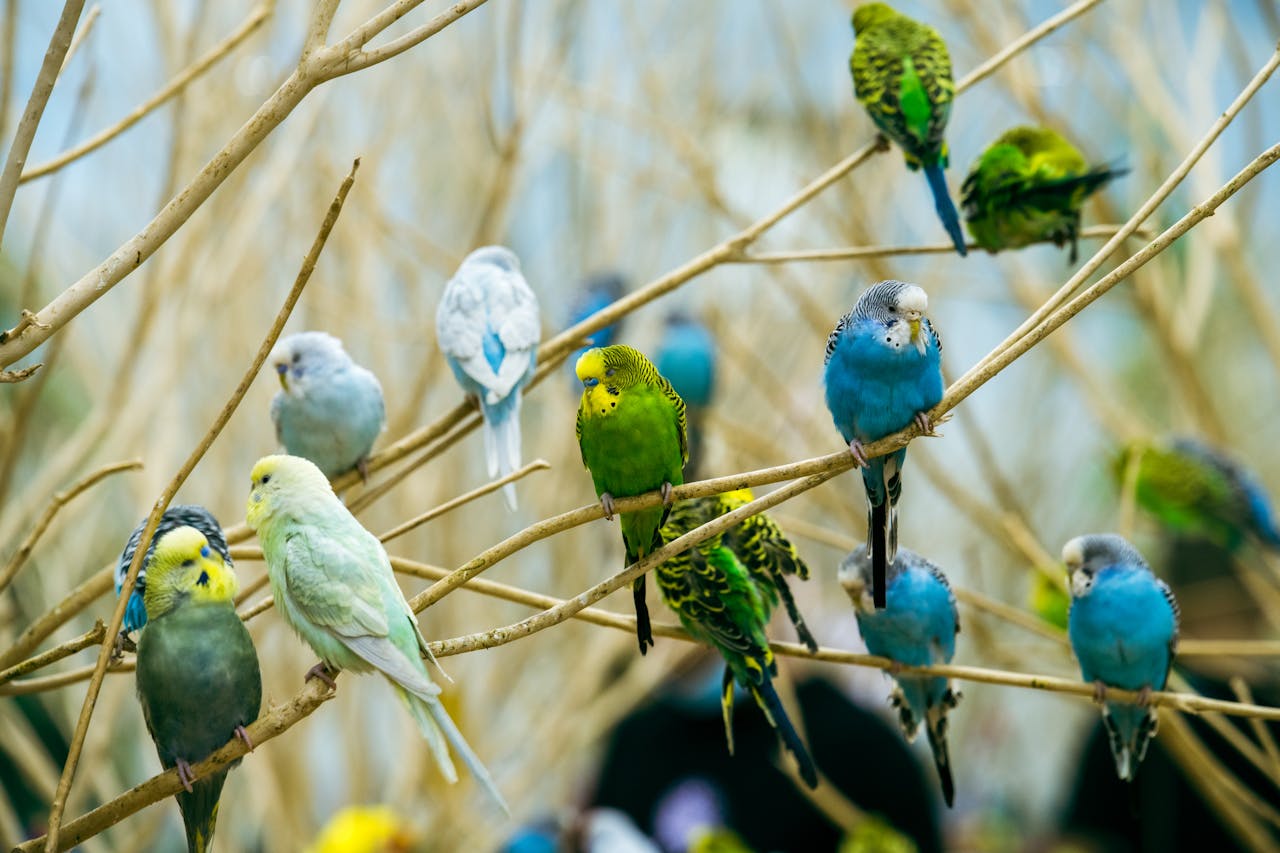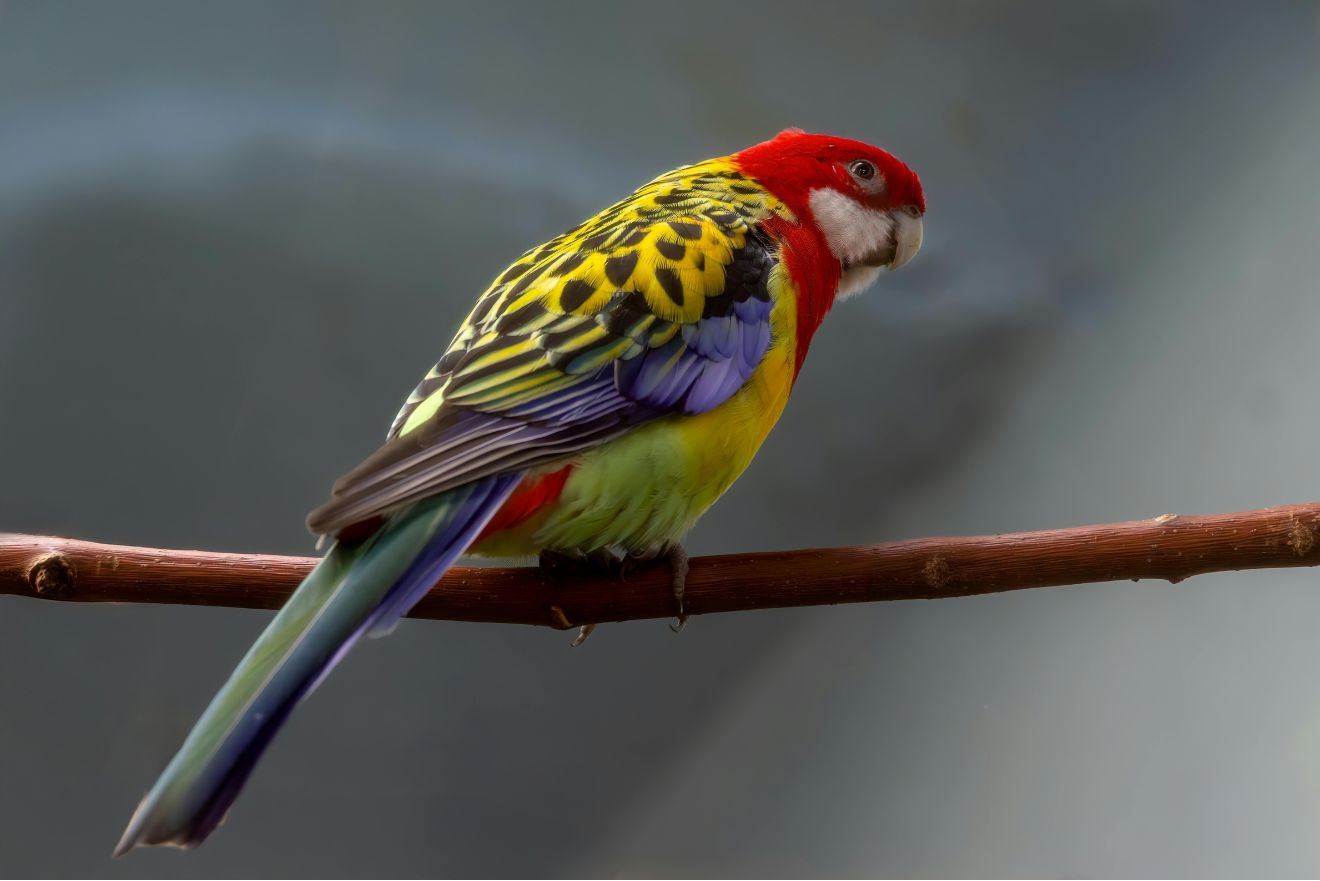Budgerigars, also known as “budgies” or parakeets, are one of the most popular pet birds in the world, loved for their bright colors, playful behavior, and ability to mimic speech.
These small parrots are ideal for beginners due to their manageable size and friendly nature, but they still require thoughtful care, a healthy diet, and daily social interaction to thrive.
This guide will walk you through everything you need to know about caring for Budgerigars and what makes them such delightful companions.
Table of Contents
Introduction
Budgerigars are small, energetic, and intelligent birds originally from Australia. Known for their cheerful personalities and vocal talents, budgies make wonderful pets for families and individuals alike.
With proper attention, these feathered friends can bring years of joy, bonding closely with their owners and even learning to say a few words.
For more on the joys of pet birds, explore our article on Why Birds Make the Perfect Pets.

Origin and Natural Habitat
Budgerigars are native to the grasslands and scrublands of Australia. In the wild, they live in flocks, flying long distances in search of food and water.
Their natural diet includes seeds, grasses, and occasionally fruits. They are highly social animals, thriving in large groups and relying on constant communication through chirping and body language.
Physical Traits: Size, Color, and Lifespan
Budgies are small parrots, typically about 6 to 8 inches (15–20 cm) in length, with slender bodies and long tail feathers.
Wild budgies are green and yellow, but captive breeding has introduced colors like blue, white, violet, and grey.
With good care, budgerigars live between 7 and 12 years, though some can live up to 15 years in ideal conditions.
Unique Traits of Pets
Budgies have several characteristics that make them stand out as pets:
- Vocal Abilities: Males, especially, are great mimics, often picking up whistles, tunes, and short phrases.
- Playful Nature: They love toys, mirrors, swings, and exploring their surroundings.
- Affectionate Bonds: Budgies can form close relationships with their owners and enjoy being handled gently.
- Social Birds: While they do well solo with human interaction, budgies often thrive in pairs or small groups.

Choosing the Right Budgerigar
When selecting a budgie, look for one with clear eyes, smooth feathers, and active behavior. Healthy budgies should be alert and responsive, not fluffed up or sleepy.
It’s recommended to get your bird from a responsible breeder or rescue that socializes their birds and ensures proper health care.
Diet and Nutrition
Budgies need a balanced diet to stay healthy. Their primary food should be high-quality parakeet seed mix or pellets, supplemented with fresh vegetables (like spinach, carrots, and broccoli) and small amounts of fruit (apple, banana).
Avoid giving them avocado, chocolate, onion, garlic, or anything with caffeine, which are toxic to birds. Fresh water should always be available.
Housing and Environment
Budgies require a spacious cage with enough room to flap their wings and hop around. The recommended minimum size is 18x18x24 inches for one bird, but larger is always better.
Include perches, mirrors, swings, and toys to keep them entertained. Place the cage in a bright, draft-free area where they can feel part of the household without being overwhelmed by noise.

Grooming and Hygiene
Budgerigars are generally clean birds, but they appreciate opportunities to bathe in shallow water or with a gentle mist spray.
Their nails may occasionally need trimming, and their beaks should stay in shape naturally with chew toys and mineral blocks. Regularly clean their cage, food bowls, and perches to prevent infections.
Fun Facts About Budgerigars
- Budgies are the third most popular pet in the world after dogs and cats.
- Wild budgies can fly over 300 kilometers in a day searching for food.
- Some budgies have learned over 100 words!
- Male budgies often sing to impress their mates or reflect their cheerful moods.
Training and Socialization
Budgies are quick learners and enjoy interaction. You can train them to perch on your finger, come when called, and even talk with positive reinforcement using treats and praise.
Start slow, especially with a new bird, and spend time daily talking or playing to build trust and reduce stress.
Common Health Issues
Like all pets, budgies can experience health problems, such as:
- Scaly Face Mites: Causes a crusty buildup on the beak and face.
- Feather Plucking: Often due to stress or boredom.
- Respiratory Infections: Sneezing, wheezing, or tail bobbing may indicate illness.
- Obesity: Too many seeds and not enough activity can lead to weight issues.
- Psittacosis: A serious bacterial infection that can also affect humans.
Always consult an avian vet if you notice changes in behavior, droppings, or appearance.

Breeding Information
Budgies can breed easily in captivity, typically laying 4 to 6 eggs per clutch. The eggs hatch in about 18 days, and chicks fledge the nest after 4–5 weeks.
Breeding should be approached responsibly, with proper nesting boxes and nutritional support for the parents.
Signs of a Healthy Budgerigar
- Bright, alert eyes and upright posture
- Active and vocal behavior
- Clean feathers and smooth breathing
- Regular eating and droppings
Interaction with Other Pets
Budgerigars can coexist with other birds of similar size but must be carefully introduced. Never leave them unsupervised with larger pets like cats or dogs, as their small size makes them vulnerable.
Noise Levels
Budgies are generally quiet compared to larger parrots. They chirp and chatter throughout the day but are unlikely to disturb neighbors.
However, they may get noisier if bored or seeking attention.

Challenges of Owning a Budgerigar
- Requires daily attention and interaction.
- Can get lonely or depressed if left alone for long hours.
- May develop bad habits like biting if not properly socialized.
- Needs regular cage cleaning and diet management.
- Sensitive to temperature and household fumes.
Learn More About Bird Breeds
Budgerigars are just one of the many captivating birds you can welcome into your home. Explore more incredible pet bird species through our detailed guides:
- Macaws: Majestic Pet Birds, Jewels of the Avian World – Discover the beauty, intelligence, and charisma of Macaws, known for their vibrant colors and strong personalities.
- Cockatiels for Beginners: Tips to Keep Your Feathered Friend Happy – Perfect for new bird owners, this guide covers essential care tips, socialization, and common behavior of friendly and charming Cockatiels.
- Lovebirds Behavior & Bonding: Secrets to a Happy Pet – Learn how to bond with these affectionate birds and understand their playful, loyal nature and emotional needs.
- African Grey Parrots: Why They Are the Smartest Pet Birds? – Explore the intelligence, communication skills, and care needs of these famously clever parrots.
- Parrotlets Care Guide: Diet, Training & Lifespan Tips for Owners – A compact bird with a bold spirit, Parrotlets are great for those wanting a smaller companion. This guide covers everything from diet to training.
- Canaries: The Ultimate Guide to These Melodic Singers in the Bird World – Discover why Canaries are beloved for their sweet songs, low maintenance needs, and peaceful presence in any home.
- Amazon Parrots: Why They Are Among the Smartest Pet Birds – Dive into the world of Amazon Parrots, known for their talking ability, social nature, and vibrant feathers.
- Why Birds Make the Perfect Pets? – Understand the benefits of bird ownership, including companionship, beauty, and their entertaining personalities.
Whether you’re new to bird keeping or expanding your flock, learning about different species helps you make informed decisions and build stronger bonds with your feathered companions.

Conclusion
Budgerigars are charming, intelligent, and easy-to-care-for birds, perfect for beginners and experienced bird owners alike.
Their playful energy, singing abilities, and affectionate nature make them beloved pets worldwide.
With proper care, social interaction, and a safe environment, your budgie can become a joyful member of your household for many years.
FAQs
Is a Budgerigar a good pet?
Yes, budgies are friendly, social, and relatively easy to care for, making them ideal for first-time bird owners.
Can Budgerigars talk?
Yes, especially males. They can learn to mimic words, sounds, and even short phrases with regular interaction.
How long do Budgerigars live?
On average, budgies live 7–12 years, though some can live up to 15 years with excellent care.
Are Budgerigars noisy?
They are moderately vocal with pleasant chirping sounds and are not as loud as larger parrots.
Can Budgies live alone?
Yes, but they require daily interaction. Keeping them in pairs helps meet their social needs if you’re away often.




